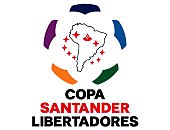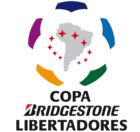Copa Libertadores
| Copa Libertadores | |

|
|
| Association | CONMEBOL |
| First edition | 1960 |
| Teams | 38 |
| Game mode |
Knockout system (qualification) Round tournament (8 groups of 4 teams each) Knockout system (from the round of 16) |
| Title holder |
|
| Record winner |
|
| Record player |
|
| Record scorer |
|
| Current season | 2020 |
| Website | conmebol.com |
| Qualification for |
FIFA Club World Cup Recopa Sudamericana |
The CONMEBOL Libertadores or Copa Libertadores (in German Liberator Cup ) is the most important South American club soccer competition , comparable to the European Champions League . Originally played as the Copa Campeones de América from 1960 to 1964 . Until 2016, the game was played from January to August. The competition is organized by the South American Football Association (CONMEBOL). Mexican teams also took part from 1998 to 2016. The winner will qualify for the FIFA Club World Cup and the upcoming Copa Libertadores, and will also play against the winner of the Copa Sudamericana for the Recopa Sudamericana , the counterpart to the UEFA Super Cup .
history
With the Campeonato Sudamericano de Campeones in Santiago in Chile in 1948, a first attempt was made to establish a competition for the champions of South America. Today it is considered the forerunner of the Copa Libertadores and was officially recognized as such by CONMEBOL in 1996. This recognition enabled the then winner CR Vasco da Gama to take part in the Supercopa Sudamericana 1997, a competition in which all clubs that had previously been successful in the Libertadores participated.
For many years the name of a commercial sponsor has been part of the official name of the competition. The competition was called the Copa Toyota Libertadores from 1998 to 2007 , the Copa Santander Libertadores from 2008 to 2012 and the tire manufacturer Bridgestone's main sponsor from 2013 to 2017 .
mode
Over time, the mode was changed several times. Initially, the game was played in a pure knockout system , later a group stage was added. Just like the number and strength of the groups, the number of clubs per country also varied. Until the 1980s, when there was a tie in the group and in the knockout rounds, the goal difference played no role, but a decider was due. At the beginning of the 1990s, if there was a tie, the goal difference also decided. If this was also the same, there were no more playoffs in the finals, but, as is usual in South America, there was a penalty shoot-out immediately after the second leg .
From 2005 to 2016, 38 teams were allowed to take part in the tournament. 44 clubs from ten nations have participated since 2017 . In addition, this year the tournament was held for the first time over the entire season of the South American football calendar, i.e. from the end of January to the end of November.
The conditions of participation differ greatly from country to country. The winning teams of the previous editions of the Copa Libertadores and the Copa Sudamericana each have a starting place. In addition, a total of seven teams from Brazil will be allowed to start (the winner of the Copa do Brasil and the six best in the championship of the previous season), from Argentina the best five teams of the previous season will be allowed to compete in the championship as well as the winner of the Copa Argentina . According to a similar key (cup winners with the three championship best), four teams from the following associations each compete: Bolivia , Ecuador , Paraguay , Peru , Uruguay and Venezuela . All participating teams must have a women's soccer team. This measure is intended to strengthen women's football in South America. For example, when the rule was announced in January 2017, only seven of the 20 clubs in the top Brazilian division had a women's football division.
28 of the 44 teams are directly qualified for the group stage. Sixteen teams play in a qualifying round for the remaining places in the group stage. The teams participating in the group stage play six games in eight groups of four teams each (three at home, three away). The first and second placed reach the round of 16 and from then on determine the winner in the knockout system with a return leg. In the final, the away goals rule will be suspended. The final is also the only round in which there is extra time. For a long time, the matches in the knockout phase were not drawn by lots, but were allocated based on the performance during the group phase, so that the best-placed first in the group played against the worst-placed second in the group. Pairings that already existed in the group stage were therefore not excluded. With the staging of 2017, this regulation was changed and there was a draw for the round of 16 for the first time.
In 2017, video evidence was used for the first time at the semi-finals and finals . In the 2018 edition , the referees were able to access the VAR from the quarter-finals. In the same year, there was a final outside of the South American continent for the first time due to riots before the final second leg . The second leg of the self-proclaimed Liberation Cup took place in the capital of the former colonial power of a large part of Latin America, namely in the Estadio Santiago Bernabéu in Madrid.
Since it took place in 2019 , the winner of the competition will no longer be determined in a two-way leg, but in a single game. The location of the first game in the final was the Estadio Monumental "U" in Lima .
Leaderboards
| rank | society | title | Final participation | Quota |
|---|---|---|---|---|
| 1 |
|
7th | 7th | 100% |
| 2 |
|
6th | 10 | 60% |
| 3 |
|
5 | 10 | 50% |
| 4th | Estudiantes de La Plata | 4th | 5 | 80% |
| 5 |
|
4th | 7th | 60% |
| 6th |
|
3 | 7th | 43% |
| 7th |
|
3 | 6th | 50% |
|
|
3 | 6th | 50% | |
| 9 |
|
3 | 5 | 60% |
| 10 |
|
3 | 4th | 75% |
| 11 |
|
2 | 4th | 50% |
| 12 |
|
2 | 3 | 67% |
|
|
2 | 3 | 67% | |
| 14th |
|
2 | 2 | 100% |
| 15th |
|
1 | 4th | 25% |
| CSD Colo-Colo | 1 | 2 | 50% | |
| 17th |
|
1 | 1 | 100% |
|
|
1 | 1 | 100% | |
|
|
1 | 1 | 100% | |
| CR Vasco da Gama | 1 | 1 | 100% | |
|
|
1 | 1 | 100% | |
|
|
1 | 1 | 100% | |
| Corinthians São Paulo | 1 | 1 | 100% | |
|
|
1 | 1 | 100% | |
|
|
1 | 1 | 100% |
| rank | country | title | Final participation | Clubs (italics: only finalists) |
Quota |
|---|---|---|---|---|---|
| 1 |
|
25th | 36 | CA Independiente, Boca Juniors, Estudiantes de La Plata, River Plate, Racing Club, Argentinos Juniors, CA Vélez Sársfield, CA San Lorenzo de Almagro , CA Newell's Old Boys | 69% |
| 2 |
|
19th | 33 | FC Santos, FC São Paulo, Cruzeiro Belo Horizonte, Grêmio Porto Alegre, SC Internacional, Palmeiras São Paulo, Flamengo Rio de Janeiro, CR Vasco da Gama, Corinthians São Paulo, Atlético Mineiro , AD São Caetano, Atlético Paranaense, Fluminense FC | 56% |
| 3 |
|
8th | 16 | Peñarol Montevideo, Nacional Montevideo | 50% |
| 4th |
|
3 | 8th | Club Olimpia , Club Nacional | 38% |
| 5 |
|
3 | 10 | Atlético Nacional, Once Caldas , Deportivo Cali, América de Cali | 30% |
| 6th |
|
1 | 6th | CSD Colo-Colo , Unión Española, CD Cobreloa, CD Universidad Católica | 17% |
| 7th |
|
1 | 4th | Liga de Quito , Barcelona SC , Independiente del Valle | 25% |
| 9 |
|
0 | 3 | Cruz Azul CD, Guadalajara CD, UANL Tigres | |
| 10 |
|
0 | 2 | Universitario de Deportes, Sporting Cristal |
Records
(As of April 6, 2020)
|
Logo history
| General logo | Logo 1998 to 2007 | Logo 2008 to 2012 | Logo 2013 to 2016 | Logo since 2017 |
 |
 |
 |

|
Individual evidence
- ↑ Main sponsor Bridgestone - press release on conmebol.com ( Memento from January 2, 2013 in the web archive archive.today )
- ↑ À la Champions: Libertadores cresce e jogos serão de fevereiro a novembro , report in Portuguese on globo.com from September 27, 2016, accessed on May 21, 2019
- ↑ CBF anuncia que o Brasil terá mais duas vagas na próxima Libertadores , report in Portuguese on globo.com from October 2, 2016, accessed on May 21, 2019
- ↑ Clube sem futebol feminino ficará fora da Libertadores a partir de 2019 , report in Portuguese on globo.com of January 26, 2017, accessed on May 21, 2019
- ↑ CONMEBOL LIBERTADORES BRIDGESTONE: Sorteio das Oitavas de Final , communication in Portuguese on conmebol.com of June 14, 2017, accessed on May 21, 2019
- ↑ Video evidence from 2018 , report on otempo.com.br from July 5, 2018, page in portug., Accessed on July 6, 2018
- ↑ Final from 2019 , report on weltfussball.com from February 23, 2018, accessed on October 5, 2018
- ↑ Martín Fernandez / Raphael Sibilla: Conmebol, Flamengo e River Plate decidem: final da Libertadores sai de Santiago e será em Lima no dia 23 de novembro. November 5, 2019, accessed November 6, 2019 (Portuguese).
- ↑ FOCUS Online: Because of unrest: Libertadores finals moved from Santiago de Chile to Lima. Retrieved November 5, 2019 .
- ↑ weltfussball.de: Copa Libertadores record player.
- ↑ weltfussball.de: Copa Libertadores record scorers.
See also
Web links
- Copa Libertadores at rsssf.com (English)